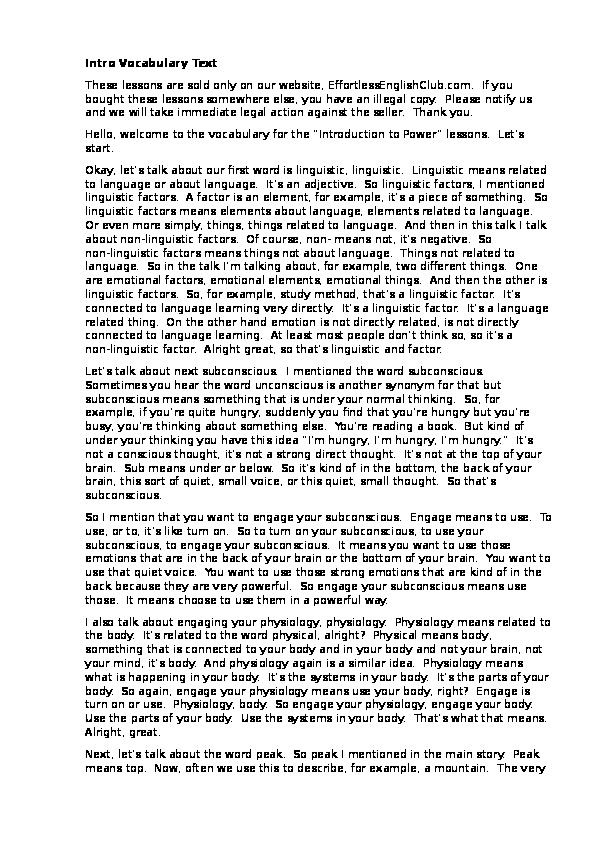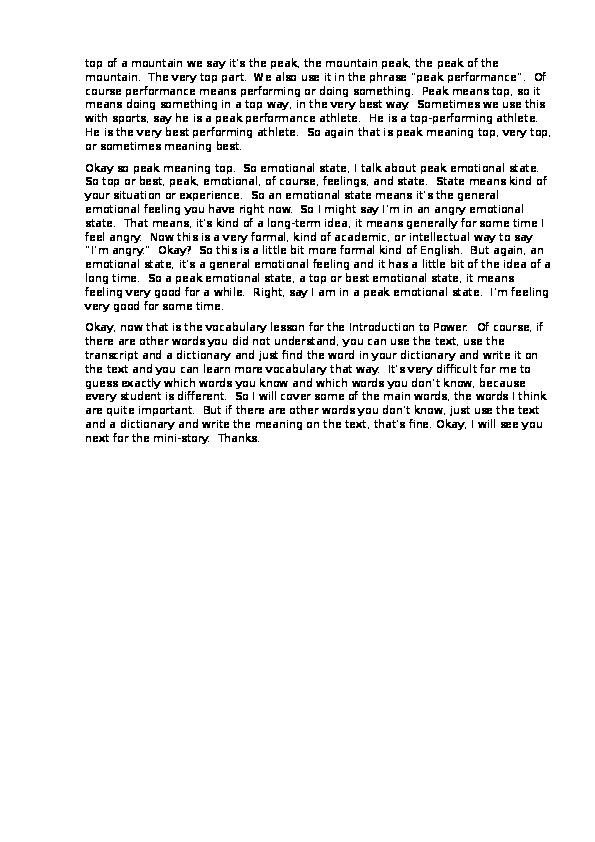Okay, let’s talk about our first word is linguistic, linguistic. Linguistic means related to language or about language. It’s an adjective. So linguistic factors, I mentioned linguistic factors. A factor is an element, for example, it’s a piece of something. So linguistic factors means elements about language, elements related to language. Or even more simply, things, things related to language. And then in this talk I talk about non linguistic factors. Of course, non means not, it’s negative. So non linguistic factors means things not about language. Things not related to language. So in the talk I’m talking about, for example, two different things. One are emotional factors, emotional elements, emotional things. And then the other is linguistic factors. So, for example, study method, that’s a linguistic factor. It’s connected to language learning very directly. It’s a linguistic factor. It’s a language related thing. On the other hand emotion is not directly related, is not directly connected to language learning. At least most people don’t think so, so it’s a non linguistic factor. Alright great, so that’s linguistic and factor.
Intro Vocabulary Text
These lessons are sold only on our website, EffortlessEnglishClub.com. If you
bought these lessons somewhere else, you have an illegal copy. Please notify us
and we will take immediate legal action against the seller. Thank you.
Hello, welcome to the vocabulary for the “Introduction to Power” lessons. Let’s
start.
Okay, let’s talk about our first word is linguistic, linguistic. Linguistic means related
to language or about language. It’s an adjective. So linguistic factors, I mentioned
linguistic factors. A factor is an element, for example, it’s a piece of something. So
linguistic factors means elements about language, elements related to language.
Or even more simply, things, things related to language. And then in this talk I talk
about non-linguistic factors. Of course, non- means not, it’s negative. So
non-linguistic factors means things not about language. Things not related to
language. So in the talk I’m talking about, for example, two different things. One
are emotional factors, emotional elements, emotional things. And then the other is
linguistic factors. So, for example, study method, that’s a linguistic factor. It’s
connected to language learning very directly. It’s a linguistic factor. It’s a language
related thing. On the other hand emotion is not directly related, is not directly
connected to language learning. At least most people don’t think so, so it’s a
non-linguistic factor. Alright great, so that’s linguistic and factor.
Let’s talk about next subconscious. I mentioned the word subconscious.
Sometimes you hear the word unconscious is another synonym for that but
subconscious means something that is under your normal thinking. So, for
example, if you’re quite hungry, suddenly you find that you’re hungry but you’re
busy, you’re thinking about something else. You’re reading a book. But kind of
under your thinking you have this idea “I’m hungry, I’m hungry, I’m hungry.” It’s
not a conscious thought, it’s not a strong direct thought. It’s not at the top of your
brain. Sub means under or below. So it’s kind of in the bottom, the back of your
brain, this sort of quiet, small voice, or this quiet, small thought. So that’s
subconscious.
So I mention that you want to engage your subconscious. Engage means to use. To
use, or to, it’s like turn on. So to turn on your subconscious, to use your
subconscious, to engage your subconscious. It means you want to use those
emotions that are in the back of your brain or the bottom of your brain. You want to
use that quiet voice. You want to use those strong emotions that are kind of in the
back because they are very powerful. So engage your subconscious means use
those. It means choose to use them in a powerful way.
I also talk about engaging your physiology, physiology. Physiology means related to
the body. It’s related to the word physical, alright? Physical means body,
something that is connected to your body and in your body and not your brain, not
your mind, it’s body. And physiology again is a similar idea. Physiology means
what is happening in your body. It’s the systems in your body. It’s the parts of your
body. So again, engage your physiology means use your body, right? Engage is
turn on or use. Physiology, body. So engage your physiology, engage your body.
Use the parts of your body. Use the systems in your body. That’s what that means.
Alright, great.
Next, let’s talk about the word peak. So peak I mentioned in the main story. Peak
means top. Now, often we use this to describe, for example, a mountain. The verytop of a mountain we say it’s the peak, the mountain peak, the peak of the
mountain. The very top part. We also use it in the phrase “peak performance”. Of
course performance means performing or doing something. Peak means top, so it
means doing something in a top way, in the very best way. Sometimes we use this
with sports, say he is a peak performance athlete. He is a top-performing athlete.
He is the very best performing athlete. So again that is peak meaning top, very top,
or sometimes meaning best.
Okay so peak meaning top. So emotional state, I talk about peak emotional state.
So top or best, peak, emotional, of course, feelings, and state. State means kind of
your situation or experience. So an emotional state means it’s the general
emotional feeling you have right now. So I might say I’m in an angry emotional
state. That means, it’s kind of a long-term idea, it means generally for some time I
feel angry. Now this is a very formal, kind of academic, or intellectual way to say
“I’m angry.” Okay? So this is a little bit more formal kind of English. But again, an
emotional state, it’s a general emotional feeling and it has a little bit of the idea of a
long time. So a peak emotional state, a top or best emotional state, it means
feeling very good for a while. Right, say I am in a peak emotional state. I’m feeling
very good for some time.
Okay, now that is the vocabulary lesson for the Introduction to Power. Of course, if
there are other words you did not understand, you can use the text, use the
transcript and a dictionary and just find the word in your dictionary and write it on
the text and you can learn more vocabulary that way. It’s very difficult for me to
guess exactly which words you know and which words you don’t know, because
every student is different. So I will cover some of the main words, the words I think
are quite important. But if there are other words you don’t know, just use the text
and a dictionary and write the meaning on the text, that’s fine. Okay, I will see you
next for the mini-story. Thanks.


